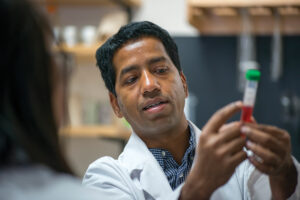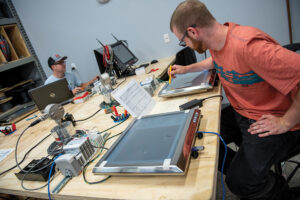Goal Three
Prepare the knowledge-and-innovation workforce for Maine
Key to the growth of R&D in a state or nation is the presence of educational systems and institutions that prepare the learners who will work in the emerging industries; who will invent the ideas, techniques, and technologies of those industries for the future; and who are prepared to collaborate across disciplines, with diverse teams, to solve yet-unimagined problems through convergence approaches. For Maine, this means ensuring that our public research university and all public education institutions prepare students to work with — and to become — the discoverers, inventors, innovators, and business leaders of tomorrow in Maine, and that the universities are adequately resourced to provide that preparation. The impact of thousands of graduates of System universities ready to enter the Maine workforce, equipped with state-of-the art knowledge about technologies, data science, innovation and problem-solving in fields and sectors key to Maine’s future, will be enormous.
 A fundamental aspect of the environment for this kind of preparation is having active researchers working directly and extensively with undergraduate and graduate students. This engagement occurs in university classrooms, in course-related labs, in research labs, in field sites, in community-engaged partnerships, and in connection with internship and external work experiences.
A fundamental aspect of the environment for this kind of preparation is having active researchers working directly and extensively with undergraduate and graduate students. This engagement occurs in university classrooms, in course-related labs, in research labs, in field sites, in community-engaged partnerships, and in connection with internship and external work experiences.
U.S. News and World Report posted “10 reasons to go to a research university” that apply to Maine. Several of its points are particularly pertinent: “Courses at research universities often incorporate the latest research.” The article continues, “Faculty can be more energized/Faculty at research universities are often making genuine discoveries; there are state-of-the-art facilities; you could get an advantage for admission to graduate and professional schools; you can network with distinguished and well-placed people in the field.”lvi This kind of outstanding educational opportunity is present in Maine, not only at UMaine, but in specific areas in other parts of the System, as well. Those include, for example, health policy at the University of Southern Maine, education at the University of Maine at Farmington, biology at the University of Maine at Augusta, marine sciences at the University of Maine at Machias, agriculture at the University of Maine at Presque Isle, and forestry at the University of Maine at Fort Kent.
Uniquely powerful learning experiences through research for all students
Perhaps most important for Maine, the universities provide uniquely powerful learning experiences for the students who will graduate from their programs and become Maine’s workforce, particularly for those whose professors are active researchers and scholars. Those faculty are working daily in their labs, generating new knowledge that is helping to solve challenges in Maine that range from the effective use of nanocellulose from forest biomass, to diagnosing and seeking cures for disease, to engineering structures that will revolutionize the production of renewable energy, to creative works that sustain our culture and enrich our quality of life. And they also are working daily in their classrooms, engaging with students who have a front-row seat to the discovery, creation, and innovation their professors are providing. At UMaine, many students have the opportunity to have a research experience in their classroom, a lab, or a field site. Across the System, students are working in communities, alongside their professors, to bring research to bear on local challenges and problems. Because their education in a research university centers on the development of these skills, students learn how to be creative problem solvers, how to apply principles of science and engineering in unexpected contexts, and how to collaborate and work across disciplines.
In describing the need for “knowledge workers” in Maine, Richert (2014)lviii argues “their common denominator is the discovery, generation, use, management, or distribution of knowledge and information, often including intellectual property.” That very description characterizes what researchers do every day in their work, and clarifies the distinctive role of a research university. Having those researchers as teachers uniquely shapes the development of students at a research university. Expanding opportunities for doctoral research and research in graduate education Graduate students are essential to expansion of the R&D enterprise across the System and, thus, the improvement of the Maine economy. They extend the reach of researchers, playing key roles in all aspects of the research process, from problem formulation through data collection to specialized knowledge of use of tools and instruments, to analysis and interpretation, to engagement with the community, to career opportunities through spin-offs. They are interested in becoming experts in data science, instrument operation, community-engaged research to solve real problems in Maine, and interpretation and communication of research.
An important factor in national rankings of universities (i.e., Carnegie Classification) is the number of doctoral degrees conferred by an institution. In addition to increasing research expenditures System-wide, we will increase the number of doctoral students to support the robust R&D enterprise. As part of the doctoral experience, our students are guided by world-class faculty, they mentor master’s and undergraduate students, they provide expert undergraduate instruction, and they aim for careers in academia and beyond, bolstering the scientific workforce in Maine. These graduate students often seek employment within the System and help expand expertise. Projections about job openings in Maine indicate that over the next 10 years there will be need for people with graduate degrees in education administration, statistics, mental health/substance abuse, advanced nursing, and speech pathology. Universities in Maine can gear up to ensure that programs are available to fill that state need.
National trends in STEM graduate education indicate the need for more interdisciplinary programs that provide experiences in convergent research, that prepare students for data-intensive science, and that enable students to consider careers outside of academia. UMaine recently convened a Graduate Education Summit of campus leaders to plan for such future directions. Given trends in science and research, approaches such as hiring cluster groups of faculties around interdisciplinary themes, as UMaine already is doing, and enabling more “free-standing” Ph.D. programs so that such faculty can provide cutting-edge preparation, may be worthwhile and could be expanded.
Establishing pathways to Maine careers for System students
Based on conversations in the development of this plan, we aspire to guarantee that every student in the University of Maine System has opportunities to engage significantly in research, innovation, and/or creation of knowledge experiences beginning in fall 2020.
 UMaine will initiate a pilot program and provide support for faculty to work toward grand challenge or theme-based courses, modules, or combinations that enable the introduction of “core” standards and foundational disciplinary knowledge within a problem or theme-based structure. This type of education, often called problem-based learning or project-based learning, requires students to be active in the educational process, and promotes collaborative work. Several educational institutions have begun to adopt or promote this model of learning. In a recent report on educating Gen Z students, Selingo (2018) suggests that attending to students’ top reasons for going to college, and their learning preferences, is critical for higher education. The most common reason these students decide to attend college is “to get a better job.” Instruction should include a blend of “independent and group work and experiential opportunities.” Experience with faculty who are directly engaged in research and scholarship can be arranged in that mode.
UMaine will initiate a pilot program and provide support for faculty to work toward grand challenge or theme-based courses, modules, or combinations that enable the introduction of “core” standards and foundational disciplinary knowledge within a problem or theme-based structure. This type of education, often called problem-based learning or project-based learning, requires students to be active in the educational process, and promotes collaborative work. Several educational institutions have begun to adopt or promote this model of learning. In a recent report on educating Gen Z students, Selingo (2018) suggests that attending to students’ top reasons for going to college, and their learning preferences, is critical for higher education. The most common reason these students decide to attend college is “to get a better job.” Instruction should include a blend of “independent and group work and experiential opportunities.” Experience with faculty who are directly engaged in research and scholarship can be arranged in that mode.
There is support across the System institutions for further development of workforce training and recruitment pathway programs, including student internships, co-ops, and fellowships statewide and with geographic relevance. This can occur through partnerships with Maine businesses and industries to address their workforce needs.
At the University of Maine, students in each college have the option to participate in internships, and most of them will do so in Maine-based organizations, such as state government, health care providers, private nonprofits, and private corporations. Other campuses also have extensive internship opportunities. Throughout the System, several academic programs require capstone projects that challenge students to produce original ideas, engage in research, solve real problems, and present their findings. Research activity also is incorporated into regular coursework, and there is a growing interest and emphasis on campuses to promote interdisciplinary research experiences for students. Students have many opportunities to develop and refine their research skills and professional capacities. On several campuses, undergraduates have the opportunity to engage in community-based research activity. There is great interest overall in expanding these options and making them possible for more students in the System.
Community-engaged research connected to undergraduate learning
Community-engaged research involves direct collaboration with local partners beyond the university to take up questions that are of interest and concern to the community. Such R&D is conducted with and for state government, business and industry, nonprofits, and community leaders, alongside faculty, staff, and students. The retraining of workers, including offering certifications, micro-credentialing, and degree completion partnerships with Maine businesses and industries, can be explored through such collaborations. In addition, there are examples where community-engaged research is incorporated into classroom-based research across the System. For instance, the University of Maine routinely involves students in classroom-based research in such areas as aquaponics, water quality, ecology, and analytical chemistry. Many programs at the Cutler Institute/Muskie School of Public Service at USM involve students as graduate or research assistants in research. An example is the Public Health Program, which over the last five years has supported 105 graduate or research assistantship opportunities that have benefited 46 graduate students. Based on accreditation documentation, approximately 67 percent of the University of Southern Maine’s health-related research projects included graduate students, and approximately 33 percent were classified as community-based. Similarly, the Maine Education Policy Research Institute,lxv jointly led by USM and UMaine, undertakes studies and data collection to support state government policy leaders in their decision-making. There is expertise and interest across the System in expanding these opportunities, which would lead to an increasingly prepared workforce and citizenry, ready to make a difference in Maine communities.
Metric for Goal Three
Sixty percent of adults in Maine have postsecondary education credentials that enable their participation in the future R&D workplace by 2025.
Key Milestones for Goal Three
- Every student in System institutions has opportunities to engage significantly in research, innovation, and/or creation of knowledge experiences beginning in fall 2020.
- The number of funded doctoral students in the System to enhance the scientific workforce in Maine and beyond will increase by 20 percent by fall 2025.
- Workforce training and recruitment pathway programs, including student internships, co-ops, and fellowships, are in place statewide, involving all System institutions, and with geographic relevance, through partnerships with Maine businesses and industries to address their workforce needs, by fall 2022.
